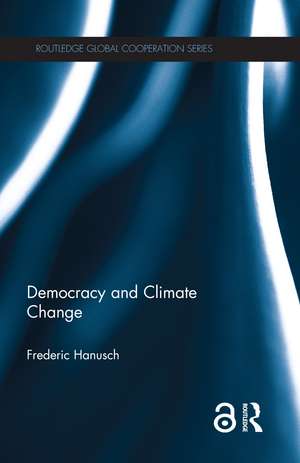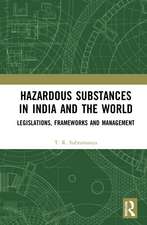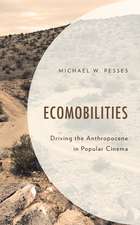Democracy and Climate Change: Routledge Global Cooperation Series
Autor Frederic Hanuschen Limba Engleză Hardback – 2 aug 2017
Beginning by outlining a general concept of democratic efficacy, the book provides an empirical analysis of the influence of the quality of democracy on climate change performance across dozens of countries. The specific case study of Canada’s Kyoto Protocol process is then used to explain the mechanisms of democratic influence in depth. The wide-ranging research presented in the book opens up several new and exciting avenues of enquiry and will be of considerable interest to researchers with an interest in comparative politics, democracy studies and environmental policies.
The Open Access version of this book, available at http://www.taylorfrancis.com, has been made available under a Creative Commons Attribution-Non Commercial-No Derivatives (CC-BY-ND) 4.0 license.
| Toate formatele și edițiile | Preț | Express |
|---|---|---|
| Paperback (1) | 454.22 lei 6-8 săpt. | |
| Taylor & Francis – 10 iun 2019 | 454.22 lei 6-8 săpt. | |
| Hardback (1) | 1001.84 lei 6-8 săpt. | |
| Taylor & Francis – 2 aug 2017 | 1001.84 lei 6-8 săpt. |
Din seria Routledge Global Cooperation Series
-
 Preț: 386.57 lei
Preț: 386.57 lei - 20%
 Preț: 267.96 lei
Preț: 267.96 lei -
 Preț: 310.70 lei
Preț: 310.70 lei -
 Preț: 434.25 lei
Preț: 434.25 lei -
 Preț: 449.41 lei
Preț: 449.41 lei - 12%
 Preț: 299.45 lei
Preț: 299.45 lei -
 Preț: 309.69 lei
Preț: 309.69 lei - 26%
 Preț: 846.92 lei
Preț: 846.92 lei -
 Preț: 454.22 lei
Preț: 454.22 lei -
 Preț: 469.34 lei
Preț: 469.34 lei -
 Preț: 416.22 lei
Preț: 416.22 lei - 12%
 Preț: 338.68 lei
Preț: 338.68 lei - 17%
 Preț: 258.30 lei
Preț: 258.30 lei -
 Preț: 469.34 lei
Preț: 469.34 lei -
 Preț: 447.68 lei
Preț: 447.68 lei - 26%
 Preț: 819.09 lei
Preț: 819.09 lei - 17%
 Preț: 257.90 lei
Preț: 257.90 lei - 16%
 Preț: 260.54 lei
Preț: 260.54 lei - 26%
 Preț: 766.24 lei
Preț: 766.24 lei -
 Preț: 465.49 lei
Preț: 465.49 lei -
 Preț: 385.80 lei
Preț: 385.80 lei -
 Preț: 385.25 lei
Preț: 385.25 lei -
 Preț: 356.44 lei
Preț: 356.44 lei
Preț: 1001.84 lei
Preț vechi: 1221.75 lei
-18% Nou
Puncte Express: 1503
Preț estimativ în valută:
191.74€ • 199.64$ • 162.04£
191.74€ • 199.64$ • 162.04£
Carte tipărită la comandă
Livrare economică 10-24 martie
Preluare comenzi: 021 569.72.76
Specificații
ISBN-13: 9780415371162
ISBN-10: 0415371163
Pagini: 308
Ilustrații: 60
Dimensiuni: 156 x 234 x 26 mm
Greutate: 0.5 kg
Ediția:1
Editura: Taylor & Francis
Colecția Routledge
Seria Routledge Global Cooperation Series
Locul publicării:Oxford, United Kingdom
ISBN-10: 0415371163
Pagini: 308
Ilustrații: 60
Dimensiuni: 156 x 234 x 26 mm
Greutate: 0.5 kg
Ediția:1
Editura: Taylor & Francis
Colecția Routledge
Seria Routledge Global Cooperation Series
Locul publicării:Oxford, United Kingdom
Public țintă
PostgraduateCuprins
Chapter 1. Introduction
Part I The Bases for the Analyses
Chapter 2. The unknown influence of democratic qualities on climate performance
Chapter 3. The concept and the operationalization of democratic efficacy
Part II. An Empirical Analysis of the Democracy-Climate Nexus
Chapter 4. Analysis I: more leads to more –positive statistical trends
Chapter 5. Analysis II: Canada’s Kyoto Protocol process, 1995-2012 - a case study perspective
Chapter 6. 1995-1997: Chrétien makes use of the prerogative
Chapter 7. 1998-2002: futile consultations
Chapter 8. 2003-2005: undemocratic unpredictability
Chapter 9. 2006-2012: democratic weakening and climate change as a shield issue
Chapter 10. Discussion analysis II: linkages between democratic quality and climate performance
Part III. Synergy
Chapter 11. Overall discussion
Chapter 12. Conclusion
Afterword
Part I The Bases for the Analyses
Chapter 2. The unknown influence of democratic qualities on climate performance
Chapter 3. The concept and the operationalization of democratic efficacy
Part II. An Empirical Analysis of the Democracy-Climate Nexus
Chapter 4. Analysis I: more leads to more –positive statistical trends
Chapter 5. Analysis II: Canada’s Kyoto Protocol process, 1995-2012 - a case study perspective
Chapter 6. 1995-1997: Chrétien makes use of the prerogative
Chapter 7. 1998-2002: futile consultations
Chapter 8. 2003-2005: undemocratic unpredictability
Chapter 9. 2006-2012: democratic weakening and climate change as a shield issue
Chapter 10. Discussion analysis II: linkages between democratic quality and climate performance
Part III. Synergy
Chapter 11. Overall discussion
Chapter 12. Conclusion
Afterword
Notă biografică
Frederic Hanusch is a postdoctoral researcher at the Institute for Advanced Sustainability Studies (IASS), Potsdam, Germany.
Recenzii
"Even though there is little doubt that climate change challenges the practice of democracy in multiple ways, the exact relationship between both is still insufficiently understood. Based on extensive data analysis, Frederic Hanusch demonstrates in great detail that countries that are more democratic also cope more successfully with climate change. The call for eco-authoritarianism – at times still raised in some quarters – can be soundly rejected based on Hanusch’s work. Democracy and Climate Change is a major contribution and important reading for all who care about the future of our democracies in a warmer world." – Frank Biermann, Copernicus Institute of Sustainable Development, Utrecht University, The Netherlands, and Chair of the Earth System Governance Project
"Established democracies today face a variety of troubles as the global response to climate change hangs in the balance. In this context, Frederic Hanusch has produced a timely, sophisticated and compelling empirical analysis of how democratic quality promotes effective climate policy performance, systematically bringing evidence to bear on a vital question." – John Dryzek, Centre for Deliberative Democracy and Global Governance, University of Canberra, Australia"This book represents a step-change in understanding the relationship between democratic systems and climate change mitigation. Through careful analysis of the characteristics of existing democracies, Frederic Hanusch provides compelling evidence that democratic quality has an effect on climate policy and reduction of greenhouse gases. The application of a conceptually novel account of democratic efficacy allows Hanusch to develop the politically significant argument that democratising democracy is critical in the fight against climate change." – Graham Smith, Centre for the Study of Democracy, University of Westminster, and Chair of the Foundation for Democracy and Sustainable Development, UK
"Established democracies today face a variety of troubles as the global response to climate change hangs in the balance. In this context, Frederic Hanusch has produced a timely, sophisticated and compelling empirical analysis of how democratic quality promotes effective climate policy performance, systematically bringing evidence to bear on a vital question." – John Dryzek, Centre for Deliberative Democracy and Global Governance, University of Canberra, Australia"This book represents a step-change in understanding the relationship between democratic systems and climate change mitigation. Through careful analysis of the characteristics of existing democracies, Frederic Hanusch provides compelling evidence that democratic quality has an effect on climate policy and reduction of greenhouse gases. The application of a conceptually novel account of democratic efficacy allows Hanusch to develop the politically significant argument that democratising democracy is critical in the fight against climate change." – Graham Smith, Centre for the Study of Democracy, University of Westminster, and Chair of the Foundation for Democracy and Sustainable Development, UK
Descriere
This book demonstrates that overall stronger democratic principles and democratic qualities tend to correlate with improved climate performance. Beginning by outlining a general concept of democratic efficacy, the book provides an empirical analysis of the influence of the quality of democracy on climate change performance.



















